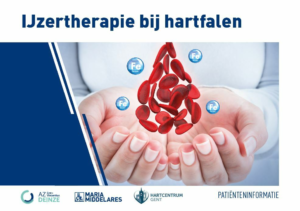Heart failure
Symptoms and causes
Symptoms and causesWhat is it?
The heart normally pumps the exact amount of blood that your body needs. With heart failure, the pump function is disrupted and the heart does not pump enough blood.
- Minor blood circulation (heart-lungs): blood and fluid accumulate in the body. You can have swollen legs and ankles.
- Major blood circulation (heart-body): there is insufficient blood pumped to the body. Blood and fluid accumulate in the lungs. You experience shortness of breath and a tickling cough.
There is systolic and diastolic heart failure:
- Systolic heart failure: the heart muscle does not contract strongly enough and pumps less blood around. This is the most common cause of heart failure.
- Diastolic heart failure: the heart muscle does not relax as well at rest and fills less well with blood.
Causes
Every case of heart failure is different.
There are many different underlying causes:
- Acute heart attack: during a heart attack, part of the heart muscle dies. This portion becomes stiff and can no longer pump. This can lead to heart failure. The severity of the heart attack determines the risk of subsequently developing heart failure.
- Hypertension (high blood pressure): high blood pressure requires the heart to pump against a high pressure. This thickens the heart muscle. Over time, the thick heart muscle becomes stiffer and less supple, which decreases its pumping force. This can lead to heart failure.
- Valve disease: when heart valves do not close properly or are narrowed, the heart has to work harder. This places additional stress on the heart and can lead to heart failure
- Heart rhythm disorders: in heart rhythm disorders, the heart beats too fast, too slow or irregularly. This causes the heart to lose its pumping force.
- Heart muscle disease: the heart muscle is thickened or dilated. The cells have an abnormal shape or are replaced by fat or connective tissue. This reduces the pumping force.
Symptoms
When there is heart failure, the amount of good blood circulating throughout the body is reduced. This means that organs receive less oxygen and nutrients.
The most important symptoms of heart failure are:
- fatigue
- shortness of breath (especially with exertion)
- leg and ankle swelling
- restless sleep and having to urinate frequently at night
Other symptoms may include:
- cold hands and feet
- heart rhythm disturbances
- feeling bloated and difficult bowel movements
- gaining weight even though you have a reduced appetite
- a tickling cough (especially when lying on your back)
- forgetfulness and lack of concentration
These symptoms may also be present when there are other conditions. If you recognise these symptoms, it does not necessary mean that you have heart failure!
In certain cases, the symptoms can be severe and urgent medical attention is required.
Call your GP or 112 immediately:
- When there is a persistent severe oppressive pain in the middle of the chest, often accompanied by sweating, nausea and vomiting
- if you experience severe shortness of breath, often in combination with wheezing or a tickling cough
Diagnosis and treatment
Diagnosis and treatmentHow is the diagnosis made?
Diagnosing heart failure is not easy. Using a stethoscope, the cardiologist listens for signs of valve abnormalities or fluid in the lungs. He or she will check fluid accumulated in the legs and whether the liver is swollen.
Additional examinations can be used to diagnose heart failure:
- Blood test
- Chest X-ray
- Electrocardiogram
- Echocardiography through the chest (trans-thoracic echocardiography)
- Diagnostic cardiac catheterisation
- Ultrasound through the oesophagus (transoesophageal ultrasound)
- Stress test (cycling test)
- Isotope examination of the heart (MIBI scan)
Treatment
The treatment of heart failure focuses on reducing symptoms. It is not always possible to take away the cause.
- Unblocking or widening the cardiac valve
- Surgical treatment of the cardiac valve
- Unblocking or widening the coronary arteries
- Bypass operation (Coronary artery bypass surgery)
- Cardiac medication
- Pacemaker (PM) implantation
- Internal defibrillator (ICD) implantation
- Cardiac rehabilitation
- Heart transplant
Leaflet
LeafletTreatment centres and specialisations
Treatment centres and specialisations
Latest publication date: 02/08/2024
Supervising author: Dr. Provenier Frank
Something wrong or unclear on this page? Report it.
Supervising author: Dr. Provenier Frank









